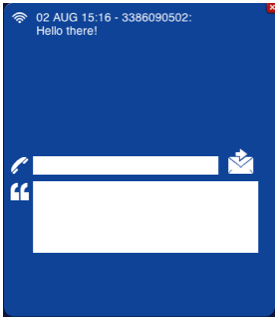Difference between revisions of "SMS (I/O Server Object)"
Jump to navigation
Jump to search
| (2 intermediate revisions by 2 users not shown) | |||
| Line 8: | Line 8: | ||
For further details refer to the [[GSM|GSM I/O Server Application Note]]. | For further details refer to the [[GSM|GSM I/O Server Application Note]]. | ||
</noinclude> | </noinclude> | ||
| − | == Parameters == | + | |
| − | *'''server id''': the server ID | + | <includeonly>==</includeonly>== Parameters ==<includeonly>==</includeonly> |
| + | *'''server id''': the server ID. Supports [[Redirect variables]] | ||
*'''position''': the object's position. Use the pixels or rows and columns coordinates format | *'''position''': the object's position. Use the pixels or rows and columns coordinates format | ||
| − | == Syntax == | + | <includeonly>==</includeonly>== Syntax ==<includeonly>==</includeonly> |
(sms <server id>; <position>) | (sms <server id>; <position>) | ||
E.g. | E.g. | ||
(sms serverid; x10y20) | (sms serverid; x10y20) | ||
Latest revision as of 16:25, 26 September 2019
The user interface for sending SMS messages:
The SMS object is listed in the Project Editor’s new object list only when at least one GSM I/O Server is defined.
For further details refer to the GSM I/O Server Application Note.
Parameters
- server id: the server ID. Supports Redirect variables
- position: the object's position. Use the pixels or rows and columns coordinates format
Syntax
(sms <server id>; <position>)
E.g.
(sms serverid; x10y20)
